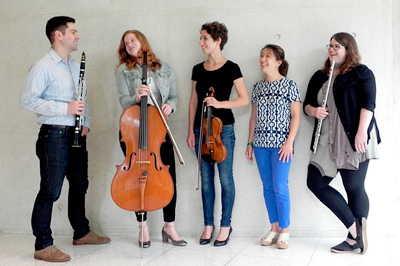by Jarrett Hoffman

On Monday, March 23 at 7:30 pm at the BOP STOP, Ars Futura will continue the 2015 edition of NEOSonicFest with a program of works by Lou Harrison, Olivier Messiaen, Robert Paterson, Jeremy Allen, Keith Fitch, and Mario Davidovsky. Ars Futura pianist and director Shuai Wang, who played with the Cleveland Chamber Symphony for last year’s NEOSonicFest, talked with us by phone, telling us first about the group’s program for Monday.
“I first thought about the repertoire considering the space we’ll be in: the BOP STOP,” she said. “I’ve been there many times, back when it was a jazz club. The ambience is so cool, so relaxed, so cozy. In some ways I picked the program to balance with the space.”
Besides Allen’s Broccoli September — a title we laughed about (“the catchy name is very typical of him,” she said) — unpredictability plays an important part in another piece on the program: Messiaen’s Le Merle Noir (re-visited). But why ‘re-visited’?
“Maddie [flutist Madeline Lucas Toliver] and I have played many, many years together, and we have actually performed this piece in the past and have really absorbed it. So we decided that this time we wanted to expand on the idea of it. Not change the piece, you see, but we’re going to experiment with it in the form of some improvisation between flute and piano. It will still be within the pitch atmosphere of the work, but with a little bit of our own understanding of it and our feelings about it.”
Another factor in the program is the addition of a sixth performer to Ars Futura’s usual mix of five (piano, flute, clarinet, violin, cello). “We have percussionist Luke Rinderknecht this season, and I really love his playing. He’ll be featured in the Davidovsky sextet, Flashbacks, our closer. I’m not even sure how many instruments Luke has to play in it — I’m going to guess fifteen. It’s a massive setup, and he’ll be dancing around in his circle. We’ve spent a lot of time as a group on this piece — I want to say over twenty hours, with a lot of late-night rehearsals — but in the end it’s a great feeling to play it. We performed it at our last concert at Cleveland State, and we thought it deserved to be played again.”
The addition of Rinderknecht will also allow Ars Futura to perform Lou Harrison’s Varied Trio. “It’s a five-movement work. In the first Luke plays very mellow vibraphones. Then in the second movement he plays rice bowls, which is really cool, and in other movements, baking pans.”
Robert Paterson’s Star Crossing will follow the Harrison and Messiaen. The composer described the piece in his program note as “my attempt to impart the sensation of what I think it might feel like to travel through the galaxy, and to give the feeling, through sound, of staring up at the star-filled sky on a quiet, clear night.” Wang talked about some of the composer’s section titles, with descriptive names like ‘galaxy section,’ ‘chimes of starlight,’ and ‘space turbulence.’ Another interesting direction above the piano part at one point reads, ‘ultra staccato and jerky-sounding, like the broken gears of a poorly-constructed spaceship.’
Wang described his style as easy on the ear. “It’s harmonious at times, but with very cool rhythmic interjections. It’s a really fun piece to play and to listen to. I think this will also be its Cleveland premiere.”
Wang said that Keith Fitch’s Come soon, come soon, like the Davidovsky, has required great discipline and lots of rehearsal from the group. “Dr. Fitch is our colleague, friend, mentor — and almost our buddy,” said Wang, laughing. “I played a lot under him with the New Music Ensemble while I was in school at CIM. This piece makes you work really hard, but after you’ve practiced a great deal together, it just comes alive. It’s been a really satisfying experience every time I’ve played his pieces.”
Wrapping up our conversation, Wang, who founded Ars Futura and co-founded Classical Revolution Cleveland, talked about how she got into music entrepreneurship. “CRC started back in 2009. I was in the middle of my DMA studies at CIM. I lived on the West Side of Cleveland, and in some ways it felt like people from there were left out. The East Side was like a faraway land. I wanted good chamber music for those people who don’t have the time or the luxury of extra cash to go to things like Cleveland Orchestra concerts. I wanted to bring people together.
“We started at the Barking Spider — just gathering with colleagues, whoever would show up, and playing chamber music. I talked to some people, and one day the owner of the Happy Dog called me. From there, it just grew. I really wanted to do more for people because everybody who came expressed such great appreciation. It made me feel so great, even though it was a lot of work, actually. You know, after going to school for so many years, you start to question what it is you actually want to do. But with this, every time it was awesome, like, ‘this is exactly what I want to do.’”
Published on ClevelandClassical.com March 20, 2015.
Click here for a printable copy of this article



